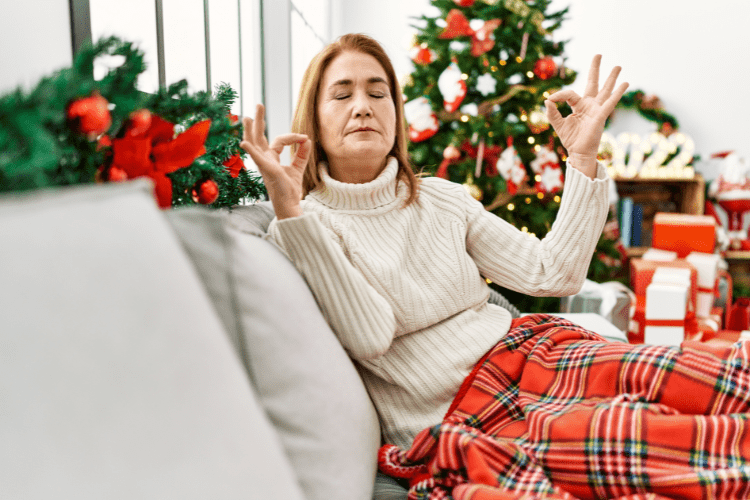Thanksgiving has passed, and now we move on to the December holidays. If you celebrate Christmas, Hanukkah, Kwanzaa, or another December holiday, you might feel some concern about how you’ll get through the season with your sobriety intact. It’s a valid concern: relapse rates have been shown to spike significantly during the holidays, and some sources report an increase of 22% in overdose deaths between November and January.
Arguably, a major trigger for holiday relapse and overdose rates is stress. The holidays tend to highlight problematic family relationships and to put a lot of pressure on everyone to be happy and joyful, all while overspending, overeating, and “overstressing” in an effort to force the holiday to be perfect.
If you’re feeling the stress, let us offer some tips to help you pause, breathe, and choose what you need to do to keep yourself on track.
Minimize Financial Stress
If you have an ample holiday budget and can indulge in worry-free splurges on food, gifts, decor, and parties, do your thing and have fun. For those who feel the strain the holiday puts on the bank account, we offer the following ideas.
- Create a holiday budget. Look at your average monthly expenses, your average monthly income, and come up with a realistic amount of money you can afford to spend on the holidays. Consider starting a holiday savings account for December 2025, something you can contribute to each month of 2025 so that you have more to work with next holiday season.
- Reconsider how, why, and to whom you give gifts. Talk with your spouse, partner, or other family members about your need to minimize extra spending, and then ask for help brainstorming ways to make the holiday feel generous and joyful without so much financial burden. For example, you could decide to:
- Make gifts for each other using repurposed or inexpensive materials.
- Set a spending limit, like no more than $20 per gift.
- Exchange names so that you buy only one gift instead of ten.
- Decide that your family will buy your gifts at the local thrift store.
- Skip the gifts altogether and opt for a family experience, like going roller-skating, seeing a movie, or exploring local attractions.
- Instead of buying new decorations, make your own or scale back.
- Instead of asking one person or family to provide the entire holiday meal, make it a potluck-style affair, with everyone contributing.
Minimize Physical Stress
Our bodies often feel the toll of the holiday season. We eat more, exercise less, lose sleep, and by the time it’s all over we feel tired, sick, and heavy. If you’re in addiction recovery, you’re all too familiar with the type of thinking that can take over during this time of year, that attitude of “Screw it – I’ll go overboard now and suffer through the consequences. It’s worth it.” You also know that it’s never worth it. Starting the new year from a place of exhaustion and sickness is no fun–and it’s a major relapse trigger. To prevent the feeling of a physical “hangover” after the holidays, we recommend the following:
- Stick to your regular diet as much as possible. Yes, it’s okay to indulge in your favorite holiday treats sometimes, but do so in moderation, and focus on giving your body the nutrients and hydration it needs to process the extra amount of fat and sugar.
- Make exercise a part of each day. Even if you can’t stick to your regular exercise routine because of time constraints, do your best to move as much as possible. Take short walks instead of naps when you need a break. Do a few stretches or pushups when you have a few minutes to spare. Take the stairs, park far away from the door–you know the tricks to keeping yourself moving.
- Don’t sacrifice sleep. Getting a good 7+ hours of sleep every night will give your body the opportunity to heal from the day’s stresses and be prepared for the next day’s tasks.
Minimize Mental and Emotional Stress
You can keep your spirit bright by using a variety of practices to stay calm amidst the chaos that holidays can generate.
- Maintain your recovery routine. Continue going to your support group meetings, therapy sessions, doctor’s appointments, and anything else that you’ve found crucial to your sobriety.
- Maintain your self-care routine. The holidays can upend the structure you’ve worked hard to build into your days. As much as possible, stick with your routine. This helps eliminate the anxiety of wondering what will happen next, and it keeps you focused on what’s more important than holiday celebrations: your health and well-being. Continue doing what soothes you, whether it’s meditation, journaling, taking walks, or having coffee with a friend.
- Connect with your spirituality. Nothing is more calming than getting perspective. When the stress overwhelms, go out into nature, or go to a church service, visit an art museum, or do some creative work of your own–whatever helps you get out of your own head.
- Be okay with saying no. Your sobriety and health matter more than anyone’s needs for your time or presence. If saying yes compromises your sobriety, say no. Trust that the people who love you will keep loving you.
Feeling Shaky in Recovery? Let Las Cruces Recovery Center Help
At any time of year, our team at Las Cruces Recovery Center in New Mexico is eager to help you discover the joys of sobriety and to give you the tools you need to sustain it. And if you’re already in recovery but feeling like a relapse is imminent, we can help get you back on track. We provide a full continuum of care, from detox to residential treatment to a robust alumni program. Contact us today to learn more.



